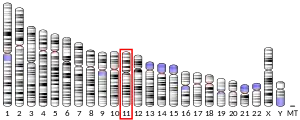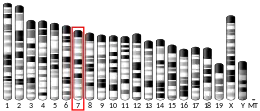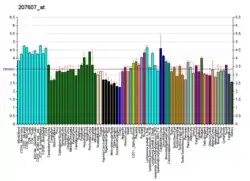ASCL2
Achaete-scute complex homolog 2 (Drosophila), also known as ASCL2, is an imprinted human gene.[5]
Function
This gene is a member of the basic helix-loop-helix (BHLH) family of transcription factors. It activates transcription by binding to the E box (5'-CANNTG-3'). Dimerization with other BHLH proteins is required for efficient DNA binding. Involved in the determination of the neuronal precursors in the peripheral nervous system and the central nervous system.[5]
Ascl2 plays a critical role in early gestation, with its products showing up in the oocyte and the two-cell stage of the zygote. This gene has its primary role after implantation of the developing embryo. It is expressed in trophoblast cells on the maternal allele. Its expression is required for the progenitor cells within the ectoplacental cone (EPC), which establishes the first functional maternal-fetal interactions before placental development is completed. The ectoplacental cone continues to develop and differentiate into other cell types which express the Ascl2 gene in the differentiated derivatives. It is specifically found in the spongiotrophoblast cells of the junctional zone. In the mature placenta, glycogen trophoblast (Gly2) cells are found in the junctional zone. Without Ascl2, the GlyT cells are not found and even though these cells develop later in gestation, its progenitor cells are established early on. If a null allele is inherited, the embryo will fail to develop. Insufficient Ascl2 function is also associated with a placenta that has phenotypic defects, which leads to growth retardation.[6]
Achaete-scute complex homolog 2 (ASCL2) is a maternally expressed imprinted gene that codes is a part of the basic helix-loop-helix (BHLH) transcription factor family. ASCL2 is particularly important during implantation of the developing embryo, specifically in placental development and neuronal precursor determination. Loss of function of ASCL2 will result in embryonic failure. In 2006, ASCL2 was observed to be involved in tumor progression, specifically, ASCL2 was reported to be upregulated in colorectal tumors (Jubb et al). In 2010, Tian et al reported that ASCL2’s involvement in metastasis could be attributed by ASCL2-promoted cellular self-renewal as opposed to cellular differentiation. In 2019, Farmarzi reported a potential link between ASCL2 and breast cancer tumorigenesis which had never previously been demonstrated. ASCL2 expression was noted in multiple breast cancer cell lines, most notably in MCF7 cells. siRNA KO of ASCL2 was shown to inhibit cellular migration of breast cancer cells. Further, ASCL2 knockdown altered the expression of BIRC5 and CD44, which are Wnt-associated genes.
References
- GRCh38: Ensembl release 89: ENSG00000183734 - Ensembl, May 2017
- GRCm38: Ensembl release 89: ENSMUSG00000009248 - Ensembl, May 2017
- "Human PubMed Reference:". National Center for Biotechnology Information, U.S. National Library of Medicine.
- "Mouse PubMed Reference:". National Center for Biotechnology Information, U.S. National Library of Medicine.
- "Entrez Gene: ASCL2 achaete-scute complex homolog 2 (Drosophila)".
- Bogutz AB, Oh-McGinnis R, Jacob KJ, Ho-Lau R, Gu T, Gertsenstein M, Nagy A, Lefebvre L (August 2018). "Transcription factor ASCL2 is required for development of the glycogen trophoblast cell lineage". PLOS Genetics. 14 (8): e1007587. doi:10.1371/journal.pgen.1007587. PMC 6105033. PMID 30096149.
- Goo YH, Sohn YC, Kim DH, Kim SW, Kang MJ, Jung DJ, Kwak E, Barlev NA, Berger SL, Chow VT, Roeder RG, Azorsa DO, Meltzer PS, Suh PG, Song EJ, Lee KJ, Lee YC, Lee JW (January 2003). "Activating signal cointegrator 2 belongs to a novel steady-state complex that contains a subset of trithorax group proteins". Molecular and Cellular Biology. 23 (1): 140–149. doi:10.1128/MCB.23.1.140-149.2003. PMC 140670. PMID 12482968.
External links
- Human ASCL2 genome location and ASCL2 gene details page in the UCSC Genome Browser.
Further reading
- Miyamoto T, Jinno Y, Sasaki T, Ikeda Y, Masuzaki H, Niikawa N, Ishikawa M (1996). "Genomic cloning and localization to chromosome 11p15.5 of the human achaete-scute homolog 2 (ASCL2)". Cytogenetics and Cell Genetics. 73 (4): 312–314. doi:10.1159/000134364. PMID 8751384.
- Alders M, Hodges M, Hadjantonakis AK, Postmus J, van Wijk I, Bliek J, de Meulemeester M, Westerveld A, Guillemot F, Oudejans C, Little P, Mannens M (June 1997). "The human Achaete-Scute homologue 2 (ASCL2,HASH2) maps to chromosome 11p15.5, close to IGF2 and is expressed in extravillus trophoblasts". Human Molecular Genetics. 6 (6): 859–867. doi:10.1093/hmg/6.6.859. PMID 9175731.
- Miyamoto T, Jinno Y, Miura K, Sengoku K, Soejima H, Yun K, Yaginuma Y, Niikawa N, Ishikawa M (1998). "A SacII polymorphism in the human ASCL2 (HASH2) gene region". Journal of Human Genetics. 43 (1): 69–70. doi:10.1007/s100380050041. PMID 9610003.
- Onions J, Hermann S, Grundström T (April 2000). "A novel type of calmodulin interaction in the inhibition of basic helix-loop-helix transcription factors". Biochemistry. 39 (15): 4366–4374. doi:10.1021/bi992533u. PMID 10757985.
- Westerman BA, Poutsma A, Looijenga LH, Wouters D, van Wijk IJ, Oudejans CB (July 2001). "The Human Achaete Scute Homolog 2 gene contains two promotors, generating overlapping transcripts and encoding two proteins with different nuclear localization". Placenta. 22 (6): 511–518. doi:10.1053/plac.2001.0695. PMID 11440538.
- Miyamoto T, Hasuike S, Jinno Y, Soejima H, Yun K, Miura K, Ishikawa M, Niikawa N (May 2002). "The human ASCL2 gene escaping genomic imprinting and its expression pattern". Journal of Assisted Reproduction and Genetics. 19 (5): 240–244. doi:10.1023/A:1015362903486. PMC 3468234. PMID 12099555.
- Goo YH, Sohn YC, Kim DH, Kim SW, Kang MJ, Jung DJ, Kwak E, Barlev NA, Berger SL, Chow VT, Roeder RG, Azorsa DO, Meltzer PS, Suh PG, Song EJ, Lee KJ, Lee YC, Lee JW (January 2003). "Activating signal cointegrator 2 belongs to a novel steady-state complex that contains a subset of trithorax group proteins". Molecular and Cellular Biology. 23 (1): 140–149. doi:10.1128/MCB.23.1.140-149.2003. PMC 140670. PMID 12482968.
- Jiang B, Mendelson CR (September 2003). "USF1 and USF2 mediate inhibition of human trophoblast differentiation and CYP19 gene expression by Mash-2 and hypoxia". Molecular and Cellular Biology. 23 (17): 6117–6128. doi:10.1128/MCB.23.17.6117-6128.2003. PMC 180905. PMID 12917334.
- Koide S, Yoshida I, Tsuji A, Matsuda Y (September 2003). "The expression of proprotein convertase PACE4 is highly regulated by Hash-2 in placenta: possible role of placenta-specific basic helix-loop-helix transcription factor, human achaete-scute homologue-2". Journal of Biochemistry. 134 (3): 433–440. doi:10.1093/jb/mvg161. PMID 14561729.
- Jubb AM, Chalasani S, Frantz GD, Smits R, Grabsch HI, Kavi V, Maughan NJ, Hillan KJ, Quirke P, Koeppen H (June 2006). "Achaete-scute like 2 (ascl2) is a target of Wnt signalling and is upregulated in intestinal neoplasia". Oncogene. 25 (24): 3445–3457. doi:10.1038/sj.onc.1209382. PMID 16568095.
- Shahib MN, Martaadisoebrata D, Kato H (November 2006). "Detection of HASH2 (ASCL2) gene expression in gestational trophoblastic disease". The Journal of Reproductive Medicine. 51 (11): 892–896. PMID 17165436.
- Jubb AM, Chalasani S, Frantz GD, et al. (2006). "Achaete-scute like 2 (ascl2) is a target of Wnt signalling and is upregulated in intestinal neoplasia". Oncogene. 25 (24): 3445–3457. doi:10.1038/sj.onc.1209382. PMID 16568095.
- Faramarzi N (2019). "A transcriptomic and molecular approach uncovering ASCL2 as a novel tumourigenic gene in breast cancer [PhD thesis]". London, UK (The University of Westminster).
{{cite journal}}: Cite journal requires|journal=(help)




